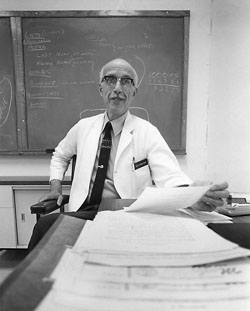 GEORGE W. COMSTOCK, MD, DrPH ’56 (1915-2007), was one of the world’s premier epidemiologists, conducting seminal research on tuberculosis control and treatment and on cancer, heart disease, and lung disease. Dr. Comstock served as a captain in the U.S. Public Health Service for 21 years and taught at The Johns Hopkins University for more than 50 years.
GEORGE W. COMSTOCK, MD, DrPH ’56 (1915-2007), was one of the world’s premier epidemiologists, conducting seminal research on tuberculosis control and treatment and on cancer, heart disease, and lung disease. Dr. Comstock served as a captain in the U.S. Public Health Service for 21 years and taught at The Johns Hopkins University for more than 50 years.
Among his accomplishments, in 1957 he organized one of the first cluster-randomized trials in medicine, a study in the Bethel region of Alaska where tuberculosis was rampant, that demonstrated the effectiveness of the drug isoniazid in preventing TB. Throughout his career, Comstock developed and conducted many innovative community health studies. His work influenced generations of students who now hold top leadership positions in public health agencies and academic organizations throughout the world.
He became professor emeritus at the Bloomberg School of Public Health in 2003, but continued to teach courses on the epidemiologic basis for tuberculosis control until his death in 2007 at the age of 92. He had a thesis to review at his bedside at the end of his life.
“George was a towering figure in the field of epidemiology; those fortunate enough to have been his students knew him as an extraordinary educator who gently led us through the logic of epidemiologic thinking and discovery.” David Celentano, Chair, Department of Epidemiology, Johns Hopkins Bloomberg School of Public Health